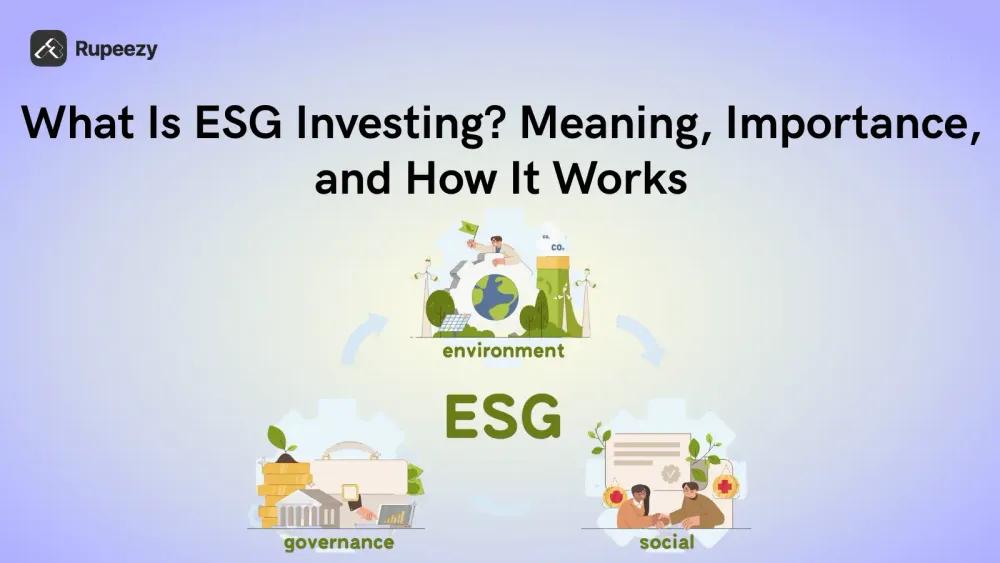What Is ESG Investing? Meaning, Importance, and How It Works


00:00 / 00:00
Businesses are now shifting their focus from just earning money to managing profits with better CSR. This is all based on the changing demands of the people who are now not just more conscious but also more concerned about the environment.
This has given rise to the concept of ESG investing. This is one of the types of trading and investing where the investors focus on the companies with better environmental, social, and governance criteria. This is in addition to the basic financial criteria that are taken into consideration.
But the question is, what is ESG investing in actual terms? Also, why is this important in today's situation? So, if you are an investor looking to improve your portfolio, read this guide. Explore all the answers you need and start investing properly.
What Is ESG Investing?
ESG investing stands for Environmental, Social, and Governance investing. It is one of the latest trading strategies that you must know. This goes far beyond traditional financial and technical analysis.
Traditionally, people focus on profitability when it comes to developing either long-term or intraday trading strategies. This investing plan focuses on sustainability and even the ethical impact as well.
In simple terms, ESG investing means focusing on selecting the companies that not only aim for financial returns but also operate responsibly toward society and the environment.
Investors assess three main pillars:
Environmental: How a company manages energy use, carbon emissions, and waste reduction.
Social: How it treats employees, supports communities, and ensures fair labor practices.
Governance: How transparent and accountable its leadership and board decisions are.
Many people confuse this with thematic investing in ESG. But this is quite different. It focuses on specific themes such as renewable energy or gender equality. On the other hand, ESG investing provides a broader framework. This helps you to identify responsible companies across all sectors.
By doing so, you are in a better position to align your investing goals with the societal goals of sustainability and ethics.
Key ESG Factors
Knowing the ESG investing concept is one thing. But when it comes to actually investing, you actually need to focus on various factors that combine to make this effective. This helps you to evaluate the investment plan based on factors that define company performance. So, here are the factors to know:
Pillar | Key Factors Considered | Focus Area |
Environmental (E) | Carbon emissions and energy efficiency Water usage and waste management Pollution control and recycling Use of renewable energy sources Climate change policies and mitigation | Helps understand how well the company is working in the environmental area. |
Social (S) | Employee health, safety, and well-being Labor rights and fair wages Diversity, equity, and inclusion (DEI) Customer satisfaction and product responsibility Community engagement and social development | This aims to identify how the company is treating employees, clients, society, and other stakeholders. |
Governance (G) | Board composition and independence Executive pay and accountability Shareholder rights and transparency Ethical conduct and compliance policies Audit practices and reporting standards | Focus on the top leadership and management that is key to working of the company for success. |
How ESG Investing Works
ESG investing follows a systematic process. It is one where you not only focus on the financial performance but also on the sustainability. Here, you would need to go beyond stocks and bonds to find the right investing choice.
So, here are the steps that you would need to follow when you are going for ESG investing:
1. Screening Companies
Investors begin by filtering companies based on ESG criteria. Here you would need to compare and evaluate all the factors like:
The company’s environmental practices
Focus on the social responsibility
Acceptance of the governance standards
Companies with poor records, such as high pollution levels or weak ethics, are excluded. And companies that are found to be performing well on all these aspects are considered to be moving ahead in the investment plan.
2. ESG Data Evaluation
Next comes the detailed study of various reports. Usually, the analysts study the following:
Detailed sustainability reports
Third-party ESG ratings
All company disclosures
They assess a company’s performance in areas like carbon footprint, diversity, labor rights, and leadership accountability. All these factors help the investor to understand the ground reality.
3. Portfolio Construction
After evaluating the data, investors select companies that meet ESG benchmarks. These firms are included in a well-diversified portfolio that balances ethical standards with long-term profitability.
4. Active Shareholder Engagement
Investors don’t just buy and hold. They also focus on proper timing to buy and sell the stocks for better results. This helps in managing the portfolio in the best manner, which is key to ensuring that you earn profits on the investment.
5. Continuous Monitoring and Reporting
Finally, ESG investments are tracked regularly. This is mainly to ensure alignment with evolving environmental and social standards. You would also need to work on the portfolio rebalancing from time to time. This will ensure that you have an investment that works the best for you and can avoid any kind of losses as well.
Pros and Cons of ESG Investing
ESG investing has become a preferred choice for many modern investors. They are looking to invest in SIP or lumpsum investment or even stocks that are focused on ESG. But just like any other investment, this also comes with its own pros and cons. So, let us now explore the same here.
Pros of ESG Investing
Long-Term Sustainability: Companies that are focused on ESG are the ones that can work better in the long run. This is one of the key factors that shows that these companies have better plans for society, employees, and growth.
Positive Impact: This is a chance for the investors to invest in companies that are performing well in terms of ESG. This allows them to contribute to companies that work for social welfare, ethical governance, and environmental protection.
Better Risk Management: When a company follows strong ESG policies, it works better. They are in a position that stands tall and can perform well even in adverse situations. These are transparent in working and are better.
Investor Attraction: A growing number of investors prefer sustainable portfolios, boosting the demand and credibility of ESG-compliant companies.
Policy Readiness: ESG-aligned companies are better positioned to adapt to new environmental and social regulations without major disruptions.
Cons of ESG Investing
Limited Data: ESG ratings and data are still developing, leading to inconsistency in evaluating company performance.
Possible Lower Returns: ESG is good, but unplanned ESG is not. This can impact the company very bad and its profits too. This can be bad for the investor.
Subjective Ratings: ESG assessment is not easy. This means no standard can define what is right or wrong. So, it can be hard.
Greenwashing Risk: Some firms may exaggerate their ESG claims to attract investors. Hence, it becomes essential to conduct research.
Short-Term Volatility: ESG portfolios may face temporary underperformance due to limited sector diversification or market fluctuations.
Why ESG Investing Is Good for Investors
ESG investing is one of the best strategies today. Investing in ESG funds offers the investors benefits such as:
Long-term financial stability with reduced risk exposure.
Better portfolio and balancing for greater returns.
Handle volatile situations well.
Proper support for the right ethics.
Transparency as to how the funds are used.
Goal alignment with larger personal goals.
Contributes to global sustainability goals.
Conclusion
ESG investing is no longer just a trend. But it is the future of investing that is focused on properly planned and responsible investing. By focusing on environmental, social, and governance factors, investors can balance long-term profitability with ethical responsibility.
This is not just a short-term trend. But it is a method of investing that will ensure that both the investors and the company benefit from the ESG plan. So, if you are ready to build a sustainable and growth-oriented portfolio, start exploring ESG investing options today with Rupeezy. Take your first step toward responsible wealth creation.
FAQs
Does ESG investing offer diversification?
Yes. ESG investing offers you good exposure to various industries and sectors to help with diversification.
Is ESG investing only for large investors?
No. You can start ESG investing through SIPs in the right mutual funds as well.
How to know the company’s ESG performance?
There are various ESG reports that you can check and evaluate. These are from company or third-party resources.
Do ESG investments perform well during market downturns?
ESG-focused companies often show resilience during downturns because they follow strong governance, risk control, and sustainable management practices.
What is the minimum amount required to start ESG investing in India?
You can start ESG investing with as low as Rs. 500 per month. Eventually, you can increase as you wish.
The content on this blog is for educational purposes only and should not be considered investment advice. While we strive for accuracy, some information may contain errors or delays in updates.
Mentions of stocks or investment products are solely for informational purposes and do not constitute recommendations. Investors should conduct their own research before making any decisions.
Investing in financial markets are subject to market risks, and past performance does not guarantee future results. It is advisable to consult a qualified financial professional, review official documents, and verify information independently before making investment decisions.

All Category










